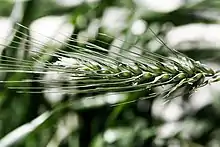awn
See also: awn.
English
Etymology
From Middle English aw(u)ne, agune, from Old Norse ǫgn (compare Danish avne), from Proto-Germanic *aganō, *ahanō (“chaff”) (compare Old English agnu, Dutch agen, German Ahne, Agen), from Proto-Indo-European *aḱanā (compare Latin agna (“ear of wheat”), Lithuanian ašnìs (“edge, blade”), Czech osina, Ancient Greek ἄκαινα (ákaina, “spike, prick”), ἄκανος (ákanos, “pine-thistle”), Sanskrit अशनि (aśáni, “thunderbolt, arrow tip”)), from Proto-Indo-European *h₂eḱ- (“sharp”). More at edge.
Pronunciation
- IPA(key): /ɔːn/
- Rhymes: -ɔːn
- Homophone: on (US, Southern) (US, Midland US) (in accents with the cot-caught merger)
Translations
the bristle or beard of certain plants
|
Middle Welsh
Pronunciation
- IPA(key): /ˈa.un/, /au̯n/
Verb
awn
- inflection of mynet:
- first-person plural present indicative/imperative
- first-person singular imperfect indicative
Portuguese
Scots
References
- “awn, adj., n.” in the Dictionary of the Scots Language, Edinburgh: Scottish Language Dictionaries.
Welsh
Alternative forms
- (first-person singular conditional): elwn
Pronunciation
- IPA(key): /au̯n/
- Rhymes: -au̯n
Verb
awn
- inflection of mynd:
- first-person plural present indicative/future
- first-person singular conditional
- (literary) first-person plural imperative
This article is issued from Wiktionary. The text is licensed under Creative Commons - Attribution - Sharealike. Additional terms may apply for the media files.
